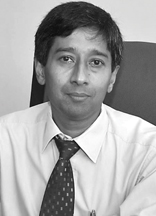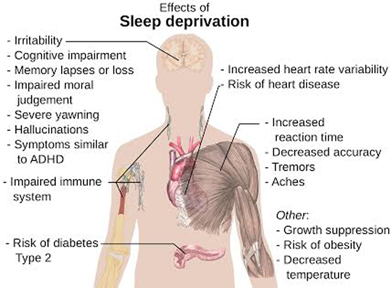|
 March
18 was World Sleep Day: March
18 was World Sleep Day:
Caught in a sleep debt
Study reveals Sri Lankans sleep an average of 6.7
hours per day and risk falling prey o a range of ailments :
by Carol Aloysius
Not getting enough sleep may not be considered a big deal for
thousands of school kids and working adults who sleep late, but have to
wake up early. However, depriving oneself of the required amount of
sleep doctors recommend can have deadly consequences, health experts
warn. Here, Consultant Paediatric Neurologist, Lady Ridgeway Hospital,
and Academic Head, Department of Paediatrics, University of Rajarata,
Anuruddha Padeniya, explains why sleep is important for good health
Excerpts…
Q: World Sleep Day was observed on March 18. Why is sleep so
important that a global day has been set aside to focus on it?
|

Dr. Anuruddha Padeniya |
A: Sleep is usually recognised by the state of quietude and
immobility accompanying the recombinant position. But neither of these
properties is a sine qua non for sleep and even without grasping the
true meaning of sleep for our lives, we know that a good night sleep is
the key factor for accomplishing a productive day. Through human and
animal studies, scientists have discovered that sleep plays a critical
role in immune function, metabolism, memory, learning, and other vital
functions in the human body. Other than that good sleep provides the
best productive workforce for a country and in a sleep deprived nation
the economic impact has been also been evident through studies.
Q: Is sleep deprivation a cause for concern among Sri Lankans?
A: The average sleep length is between 7 and 8.5 hours per
day, which would vary with many reasons, most importantly the age of the
individual. Sleep deprivation can be categorised into acute total sleep
deprivation and chronic partial sleep deprivation.
The only available study on sleep deprivation on Sri Lankans was done
by the AIA Group. The Study conducted among 15 of its markets including
Sri Lanka, reveals that though desired average hours of sleep for a Sri
Lankan is 7.6, we sleep for only an average of 6.7 hours per day.
Although there are many reasons, the recent increasing trend of
addiction to social media and to internet among adults, especially those
under 30 years, was found to be one of the key causative factors for
sleep deprivation among Sri Lankans.
Q: How do you describe sleep deprivation in medical terms?
A: Sleep deprivation is not having enough sleep, or when sleep
is insufficient to support adequate alertness, performance, and health.
It can be further divided into acute and chronic sleep deprivation.
Acute sleep deprivation can be defined as reduction in usual sleeping
hours lasting for one or two days, whereas chronic sleep deprivation is
when an individual routinely sleep less than required for optimal
functioning. In other words, sleep deprivation can be due to reduced
quantity or quality of sleep.
Q: What causes disrupted sleep or being unable to sleep at
all?
A: Out of the many causes for sleep deprivation according to
the American Academy of Sleep Medicine, voluntary behaviour, working
hours and type of the occupation and medical conditions are considered
to be the most important. Being unable to sleep is a different entity.
It is called insomnia and it can be the reason for sleep deprivation in
an individual. It is a sleeping disorder where an individual finds it
difficult to fall asleep, even though he has the optimum conditions.
Q: As a neurologist, tell us how lack of sleep can affect our
health – physically, mentally, emotionally, and in terms of our
behaviour.
A: Insufficient sleep can affect a human in many ways. Acute
sleep deprivation can make you irritable, tired and less productive. The
effects of chronic sleep deprivation may not be evident instantly but
have a more serious impact on an individual physically, mentally,
emotionally and also in term of our behaviour. The short term effects
include neurological effects, change in vital signs and hormonal
changes.
Sleep deprived individual may mimic the behaviour of a drunk person
with tremors (shakiness of the body), nystagmus and slurred speech. The
studies have found that there is significant decrement of seizure
threshold as well as threshold for pain.
Some hormones in the human body follow a circadian rhythm, which
means that the secretion of the hormone may depend on the sleep wake
cycle of a person. Some of these hormones get affected with insufficient
sleep, most importantly in children the growth hormone. These children
may not reach their full growth potential and turnout to be shorter than
they otherwise would have been.
 Q:
What about chronic sleep deprivation? Q:
What about chronic sleep deprivation?
A: Chronic sleep deprivation would have more long term effects
on one’s physical health, adversely affecting the metabolism leading to
impaired glucose tolerance, thus increasing the susceptibility to
diabetes, obesity and increasing cardiovascular events and morbidity.
Compromised immune system is evident by the susceptibility to infections
and so on.
Q: Psychological effects?
A: Psychological impact of sleep deprivation is more evident
than the physical effects because the psychological effects are plainly
demonstrated in a short time affecting one’s day to day life activities.
Restricted sleep time adversely affect the cognitive function of an
individual, lowering the stress threshold, impairing the memory and
causing trouble in concentrating.
Thus performance on psychomotor vigilant tasks such as driving,
performing surgery would be weakened. It is well documented that sleep
loss can adversely affect mood. We all know how irritable and tired we
become after a sleepless night.
Q: Have our present hectic lifestyles, also contributed to
sleep deprivation?
A: According to the AIA Healthy Living Index, sufficient sleep
is one of the top five drivers of healthy living but many adults fail to
gain enough sleep as a result of hectic lifestyle. This has been
facilitated by intensifying usage of technological modalities including
the internet and mobile phones.
Q: Which age group or groups are most vulnerable to sleep
disorders?
A: Sleep disorders consist of a large group of disorders and
most known is insomnia. Evidence from studies show that women,
particularly elderly, are more prone to have insomnia, than men. Sleep
deprivation is another entity in which teenagers and people in certain
professions including doctors, drivers, shift workers and students are
commonly exposed.
|
Some facts on sleep disorders among children
* More than a third of school children may
have sleep problems.
* Disturbed sleep at night makes it harder
for children to function and leads to lack of concentration
and behavioural problems in the classroom.
* Parents often find it hard to detect
that something is wrong.
* Most sleep problems and sleep disorders
can be treated. Most can be cured . Some can’t. But they can
be managed. |
Q: Recent research has pointed to chronic sleep deprivation as
one of the causes for the surge in diabetes, heart disorders, mental
health problems, depression and constant headaches... Do you agree?
A: Yes.
Q. There have been recent claims of persons dying in their
sleep due to chronic sleep disorder leading to fatigue and stress. How
does sleep death occur?
A: In exceptional circumstances chronic sleep deprivation is
known to cause death as in fatal familial insomnia, which is an uncommon
genetic disorder. How this occurs is still in debate.
Q. Dementia is also on the rise. Is there a link between
Dementia and sleep deprivation?
A: One of the earliest presentations in a patient with
dementia is alteration in the sleep wake cycle and the mechanism of this
is yet to be found. In an elderly person, there are some changes in the
sleep including increased nocturnal wakening and decrease in delta sleep
which are considered to be normal with aging.
With dementia patients develop additional sleep changes such as
decrease in circadian cycle length.
Q: Can sleep deprivation lead to obesity?
A: Recent advancement in neurobiology has been able to enclose
neural pathways such as the orexin system, which has a role in both
sleep and weight gain.
Thus it has been apparent that sleep and obesity are linked.
According to latest studies there is evidence in prevalence of obesity,
parallel to the rising incident of sleep deprivation.
Q: Sleep disorder and its negative impact on health is still a
relatively little understood subject. What steps have been taken to
create awareness on this subject among the public?
A: Sleep is not a well studied medical entity in Sri Lanka.
Some surveys have been done on obstructive sleep apnoea but still there
is a huge gap in studies conducted in view of sleep neurology. We have
conducted some workshops regarding sleep and its impact on children and
first Sleep Neurology Service in Sri Lanka was established in Lady
Ridgeway Hospital for Children Colombo in 2013.
Simultaneously a booklet was published as an educating tool for
adults regarding sleep and its effect on the children.
Recently a pilot survey done in selected schools in the Colombo
District revealed that the student who received adequate amount of sleep
were the ones to perform well both in academics and extracurricular
activities.In Sri Lanka schooling children are at a risk of being sleep
deprived due to their waking early to go to school and then going to bed
late at night after completing their homework and tuition classes.
On top of that, internet and video games have also contributed to the
poor quality sleep. Thus both parents and children themselves need
proper education on the importance of sleep.
(From Sleep and Your Child’ prepared as a parent
education manual on the launch of the Sleep Neurology Services in Sri
Lanka at Lady Ridgeway Hospital on March 2013) |

